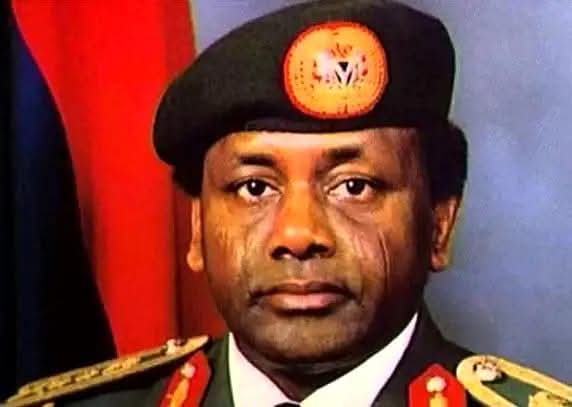THE DEATH OF GEN. SANI ABACHA: Uncovering the Clouds

Did you know that General Sani Abacha in 1993 became the first Nigerian Army officer to attain the rank of a full military general without skipping a single rank, and did not die from eating an apple from his concubines as insinuated?
General Sani Abacha GCFR, born on the 20th of September 1943 in Kano, northern Nigeria, died on the 8th of June 1998, under circumstances that have remained unclear till date. Until his death he was a Nigerian military general who served as the Military Head of State of Nigeria from 1993 until his death in 1998. He was also the Chief of Army Staff, COAS, between 1985 to 1990; Chief of Defence Staff, CDS, between 1990 to 1993; and Minister of Defence, MoD.
Abacha was born and brought up in Kano. He attended the Nigerian Military Training College in Kaduna, and was commissioned in 1963 after he had attended the Mons Officer Cadet School in Aldershot, England. Thereafter, in 1969, he fought during the Nigerian Civil War as a platoon and battalion commander and later became commander of the 2nd Infantry Division in 1975. In 1983, Abacha was General Officer Commanding (GOC) of the 2nd Mechanised Division, and was appointed a member of the Supreme Military Council.
The rise in the military career of Abacha was marked by involvement in all the military coups in Nigeria. When he was still a second lieutenant with the 3rd Battalion in Kaduna, he took part in the July 1966 Nigerian counter-coup from the conceptual stage. He could well have been a participant in the Lagos or Abeokuta phases of the coup the previous January as well. In addition, he played a prominent role in the 1983 Nigerian coup d'état which brought General Muhammadu Buhari to power; and the 1985 Nigerian coup d'etat which removed Buhari and brought General Ibrahim Babangida to power.
When General Ibrahim Babangida was named President and Commander-in-Chief of the Armed Forces of the Federal Republic of Nigeria in 1985, Abacha was named COAS and later appointed MoD in 1990. Before this time, Abacha was in 1963, Second Lieutenant (Commissioned); in 1966, Lieutenant; in 1967, Captain; in 1969, Major; in 1972, Lieutenant Colonel; in 1975, Colonel; in 1980 Brigadier General; in 1984, Major General, and in 1987 Lieutenant General.
On 17 November 1993, Abacha, being the MoD and most senior official within the military hierarchy, forced interim president Ernest Shonekan to hand over. In his nationwide broadcast, Abacha cited the socio-political uncertainties under the Interim National Government as a cause of his resignation. He went on to rule as Head of State and Commander-in-Chief of the Armed Forces of the Federal Republic of Nigeria. In September 1994, he issued a decree that placed his government above the jurisdiction of the courts effectively giving him absolute power. Another decree gave him the right to detain anyone for up to three months without trial. He further abrogated Decree 691 of 1993.
On 8 June 1998, Abacha died in the Aso Rock Presidential Villa in Abuja. He was buried on the same day according to Muslim tradition and without an autopsy, fueling speculation that he may have been assassinated. The government identified the cause of death as a sudden heart attack. BUT, it is believed by foreign diplomats, including United States Intelligence analysts, that he may have been poisoned.
His Chief Security Officer, CSO, Hamza al-Mustapha, believed he was poisoned by Israeli operatives in the company of Yasser Arafat. At his death, he was about to transfer power to a civilian government in October 1998, implemented in October 1995. After his death, General Abdulsalami Abubakar became Head of State, and in his short tenure ushered the Fourth Nigerian Republic into existence.
Meanwhile, Abacha's CSO, Major Hamza Al-Mustapha (rtd), would later dismiss insinuations that the military ruler died after eating an apple from his concubines. Giving a detailed account on how Abacha died, he said the sudden collapse of the health system of Abacha started on June 7, 1998, right from the Abuja International Airport, immediately after one of the security personnel, who accompanied President Yasser Arafat of Palestine shook hands with him.
The former CSO to Abacha, giving an account of the incident as published in THISDAY on June 16, 2021, said the following:
“Shortly after the hand shake, I noticed the change in the countenance of the late Commander-in-Chief, and I immediately informed the Aide-de-Camp, Lt. Col. Abdallah, who advised that we keep a close watch on him. Later in the evening of June 8, 1998, around 6 p.m., his doctor came around and administered an injection to stabilise him. He was advised to have a short rest. Happily enough, by 9p.m., he was bouncing and receiving visitors until much later when General Jeremiah Useni, the then minister of the Federal Capital Territory (FCT), came to see him. He was fond of the Head of State. They were very good friends. They stayed and chatted together till about 3.35a.m.
“A friend of the house was with me in my office and as he was bidding me farewell, he came back to inform me that the FCT Minister, Useni, was out of the Head of State’s Guest House within the Villa. I then decided to inform the ADC and other security guards that I would be on my way home to prepare for the early morning event at the International Conference Centre. At about 5 a.m., the security guards ran to my quarters to inform me that Abacha was very unstable. At first, I thought it was a coup attempt. Immediately I prepared myself fully for any eventuality. As an intelligence officer and the Chief Security Officer to the Head of State for that matter, I devised some means of diverting the attention of the security boys from my escape route by asking my wife to continue chatting with them at the door. She was in the house while the boys were outside. From there, I got to the Guest House of the Head of State before them.
“When I got to the bedside of the Head of State, he was already gasping. Ordinarily, I could not just touch him. It was not allowed in our job. But under the situation, I knelt close to him and shouted: ‘General Sani Abacha, Sir, please grant me permission to touch and carry you.' I again knocked at the stool beside the bed and shouted in the same manner, yet he did not respond. I then realised that there was a danger. I immediately called the Head of State’s personal physician, Dr. Wali, who arrived in the place in eight minutes from his house. He immediately gave oga (Abacha) two doses of injection, one at the heart and another close to his neck. This did not work apparently as the Head of State had turned very cold.
“He then told me that the Head of State was dead, and that nothing could be done after all. So I asked the personal physician to remain with the dead body while I dashed home to be fully prepared for the problems that might arise from the incident. As soon as I informed my wife, she collapsed and burst into tears. I secured my house and ran back to where Abacha was. At that point, the Aide-de-Camp had been contacted by me, and we decided that great caution must be taken in handling the grave situation. Again, I must reiterate that the issue of my boss dying on women was a great lie just as the insinuation that Abacha ate and died of poisoned apple was equally a wicked lie.
“It was at this point that I used our special communication gadgets to diplomatically invite the Service Chiefs, military governors and some few elements purportedly to a meeting with the Head of State by 9 a.m. at the Council Chamber. That completed, I also decided to talk to some former Nigerian leaders to inform them that Abacha would like to meet them by 9 a.m. The situation became charged when one of the Service Chiefs, Lieutenant General Ishaya Rizi Bamaiyi (rtd), who pretended to be with us, suggested he be made the new Head of State after we had quietly informed him of the death of Abacha. He even suggested we should allow him access to Chief MKO Abiola.
"We smelt a rat, and other heads of security agencies, on hearing this, advised I move Abiola to a safer place. I managed to do this in spite of the fact that I had been terribly overwhelmed with the crisis at hand. But then, when some junior officers over heard the suggestion of one of the Service Chiefs earlier mentioned, it was suggested to me that we should finish all the members of the Provisional Ruling Council and give the public an excuse that there was a meeting of the PRC during which a shoot-out occurred between some members of the Provisional Ruling Council and the body guards to the Head of State."
Until his death, Abacha was married to Maryam Abacha and had seven sons and three daughters. He became a grandfather posthumously; as of 2018 he had thirty-three grandchildren.
SOURCES:
Al-Mustapha: How Abacha Died By Chuks Okocha in ThisDayLive | Wikipedia
#penglobalfactfile #SaniAbacha


_1755775186.jpg)
